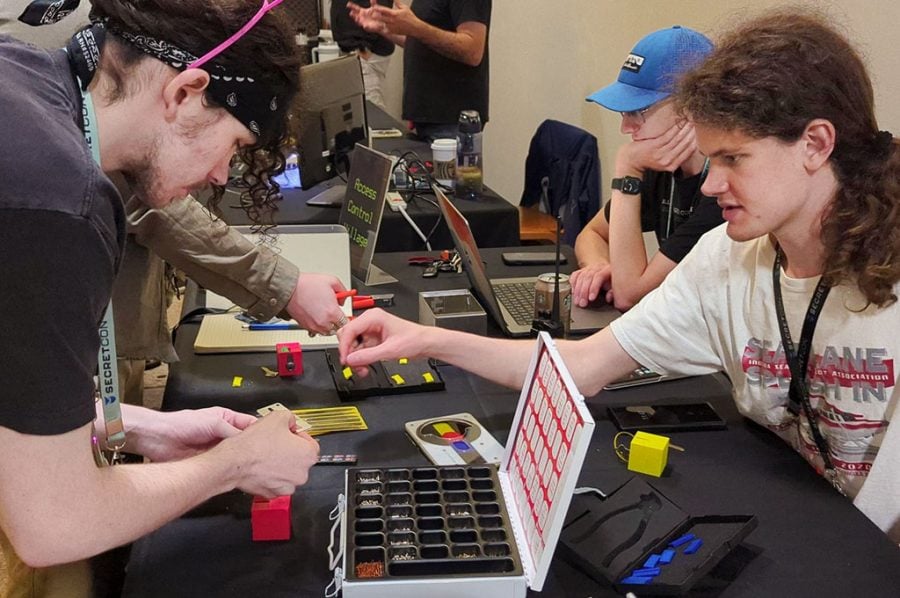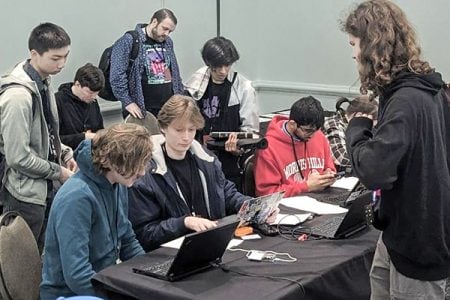
When it comes to red teaming, Michigan Tech Computing Huskies are among the best in the nation. The MTU RedTeam earned an overall Cyber Power Ranking of 22nd in the nation from the National Cyber League (NCL).
NCL said the ranking represents the ability of students to perform real-world tasks, including identifying hackers from forensic data, penetration testing and auditing vulnerable websites, recovery from ransomware attacks, and other cybersecurity functions.

In real-world operations, red teams are essential to helping organizations make improvements to run more securely. These experts are tasked with testing cybersecurity effectiveness, finding vulnerabilities, and addressing other critical issues that can put companies, industries, and individuals at risk. Michigan Tech’s student RedTeam has been preparing students to take on this challenging and important mission since 2017 by taking part in national competitions.
The team’s faculty co-advisors Bo Chen and Yu Cai are understandably proud of the team’s accomplishments—and so is U.S. Senator for Michigan Gary Peters. In a letter to Michigan Tech Vice President of Research Andrew Barnard, Peters congratulated students for ranking in the top 50 nationally.
“As Ranking Member of the Homeland Security and Governmental Affairs Committee, cybersecurity is one of my top priorities and it is great to see a Michigan university place so highly in this competition,” he said. “This is a testament to the high-quality education MTU provides to its students, and the result is certainly worthy of recognition.”
There were other high-ranking team performances to celebrate as the 2024 season wrapped. Tech’s primary competitive team, RedTeam@MTU, placed 44th out of 4,893 teams across the United States. Team members are Josh Stiebel, Noah Holland, Noah Strekow, Ethan Norush, Dane Cucinelli, Ethan Onsager, and Max Oftedahl. A second team, made up of students Justin Christenson, Joshua Stevens, Lucas Jones, Trent Verboncouer, Carter Ravenstone, and Tyler Ormstad, placed 66th.
In addition to team achievements, Husky Noah Holland turned in an outstanding performance, placing fifth out of 8,483 players. Chen and Cai said it was one of the best individual outcomes since the RedTeam began participating in the NCL competition.
MTU’s RedTeam is participating in the NCL competition in spring 2025. Members are also making plans to participate in other capture-the-flag (CTF) competitions along with continuing to present at conferences including Grrcon (the Grand Rapids Cybersecurity and Hacker Conference) and DEF CON, the largest and longest-running hacker conference in history.
About the College of Computing
The Michigan Tech College of Computing, established in 2019, is the first academic unit in Michigan dedicated solely to computing, and one of only a handful such academic units in the United States. The college is composed of two academic departments. The Computer Science department offers four bachelor of science programs in computer science, cybersecurity, data science, and software engineering; four master of science programs in applied computer science, computer science, cybersecurity, and data science; and a doctoral program in computer science. The Applied Computing department offers four bachelor of science programs in cybersecurity, electrical engineering technology, information technology, and mechatronics; and two master of science programs in health informatics and mechatronics. The college also assists in administering an interdisciplinary doctoral program in computational science and engineering.
Questions? Contact us at computing@mtu.edu. Follow the College of Computing on Facebook, Instagram, LinkedIn and Twitter.